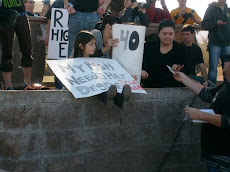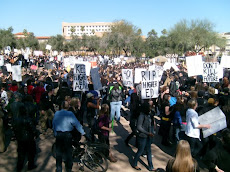On September 3, 2008, President Robert Shelton sent a memo to the University community about “Advancing Arizona’s World-Class University.” In this memo, he announced plans to “transform and strengthen The University of Arizona” and to “radically change the way we operate.”
Chief among the goals of President Shelton and Provost Meredith Hay is the streamlining of the University through consolidation of departments, colleges, and administrative positions. These plans have the potential to create exciting and productive connections between faculty and students across campus and to push the University of Arizona to the top tier of public universities. Unfortunately, it has become clear that many of the plans proposed by President Robert Shelton and Provost Meredith Hay may compromise the University of Arizona’s mission to “discover, educate, serve and inspire.” The University faces many challenges and needs to change to face them, but the current agenda does not make fiscal or educational sense.
What are the dangers?
One of the ways in which President Shelton and Provost Hay plan to save money is in course size and teaching workload. Many courses at the University of Arizona are already much larger than courses at our state and national peer institutions. Large courses negatively affect student learning and engagement with the education process, especially in foundational subjects such as first year writing, foreign languages, introductory science and math, and general education classes.
Many of these courses are taught by already over-burdened faculty, graduate students and teaching assistants, and as class sizes and workloads go up, they will be unable to give students the individual attention needed to foster learning and academic success.
It has also been proposed that many of these classes be placed online. But incoming students need the kind of personal, individual attention that can only be offered in a classroom setting. Education needs personal contact to be efficient. Placing classes online tells these students that they are not valued and displaces them from the dynamic and creative learning environment of the university setting. Studies also show that online courses create even more work for faculty and graduate students, giving them less opportunity to give students the attention they need.
In addition, students at the University of Arizona do not have access to many of the resources needed to achieve a truly “World-Class” education. The UA Libraries have been forced to reduce their acquisition of new materials and cut many journal subscriptions because the budget has not kept up with inflation. Many buildings and classrooms lack any modern instructional technology, and basic facilities are not properly maintained.
What does this mean for you and your student?
This semester the U of A has record enrollment: 38,057 students, according to the Tucson Citizen. This year the administration required that several departments open their class sizes to accommodate more students, thereby decreasing the amount of time and attention the instructor can devote to each student. At the same time, the university spent $250,000 on billboards in Phoenix in order to attract even more students. The Arizona Board of Regents recently approved a 13% tuition increase, or about $726 per in-state undergraduate.
Now President Shelton has asked the Arizona Board of Regents for an additional 13.6 million dollars to expand the medical school in Phoenix, while admitting to the Tucson Citizen that the UA is currently unable to offer its existing faculty salaries that even meet the national mean. The administration has now explicitly stated that many departments and programs will be eliminated by June 2009. It is important to consider how this will change the quality of education at our university.
The cost of tuition will continue to go up while your students attend the University of Arizona. But as class sizes go up, the return on your educational investment decreases. Essentially, you are paying more for less. Larger class sizes and higher workloads for faculty, graduate students, and teaching assistants mean that students will not get the kind of education that you need to succeed in higher education or the professional world.
What can you do?
Cutting-edge research comes from critical thinkers. The University needs to attract quality faculty by offering competitive salaries and benefits. Educational resources cannot be sacrificed in order to make way for public relations programs. While the University has a responsibility to itself and its students to remain financially sound, it should not be run like a business. Diverting money from one area of studies to another that happens to be more profitable at the time is not the reasonable response to these budget problems.
The University of Arizona needs to know that you value learning and that you and your children want to get a truly world-class education. Please contact President Shelton, Provost Hay, and the Arizona Board of Regents and let them know that in order for the University to become a top-tier institute of higher learning, class sizes and teaching workloads must be reduced to make sure that your education is meaningful.
Robert N. Shelton, PresidentAdministration Building, Room 7121401 East University Boulevard Tucson, Arizona 85721-0066
(520) 621-5511 / Fax: (520) 621-9323
Robert.shelton@arizona.edu
Meredith Hay, ProvostAdministration Building 512PO Box 210066Tucson, Arizona 85721-0066
(520) 621-1856 / Fax: (520) 621-9118
provost@email.arizona.edu
Arizona Board of Regents2020 N. Central Ave., Suite 230Phoenix, AZ 85004-4593(602) 229-2500 / Fax: (602) 229-2555
http://www.azregents.edu
The State of Arizona also needs to know that you value higher education. Write to your state representative and Governor Janet Napolitano and tell them that you believe in increased funding for higher education.
The Honorable Janet NapolitanoGovernor of Arizona1700 West WashingtonPhoenix, Arizona 85007 800-253-0883 / Fax: (602) 542-1381
Find your state legislator at: http://www.azleg.gov/
Finally, please consider donating to The University of Arizona.
The University of Arizona Foundation
1111 N. Cherry Ave.P.O. Box 210109Tucson, AZ 85721-0109
520-621-9077 / Fax: 520-621-8820
http://www.uafoundation.org
Monday, October 6, 2008
Subscribe to:
Post Comments (Atom)


No comments:
Post a Comment